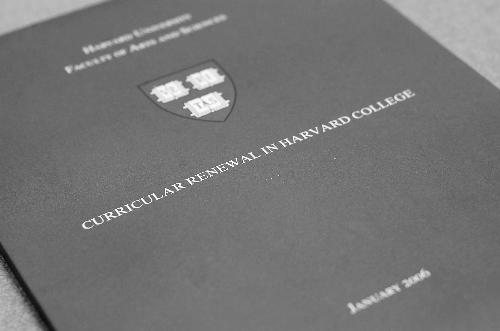
...Does Mass. Hall Matter?
News crews line the yard. Feisty reporters attack students with rapid-fire questions. Everyone seems to be talking about one thing, and one thing only: Larry Summers’ resignation. According to a Google News search, the nine days since the official announcement have generated over 1,000 articles about Summers in the United States alone. Seems like every major paper in the country has chimed in with an opinion about the Harvard presidency—as if the shakeup at Mass. Hall were the most important thing ever to happen in higher education. But what’s different, exactly, now that Summers is leaving?
As the columnists preach on about all the brokenhearted undergrads mourning at the President’s feet, actual Harvard students—that is, not hypothetical ones—don’t seem to care at all. Their reaction, or lack thereof, is historically consistent with the rest of Summers’ five-year stint, during which most students only perked up their ears when the big guy tripped up in the public eye. Whereas last year’s “women in science” debacle polarized the student body, all this vague bureaucratic stuff with the faculty hasn’t really sparked our interest.
Still, according to an oft-cited poll conducted by The Crimson two weeks ago, the kids wanted Summers to stay—Summers’ supporters at the College outnumbered his critics three-to-one. “Five more years!” they chanted before last Tuesday’s resignation speech in front of Mass. Hall. “Stay, Larry, Stay!”
And as the Los Angeles Times reported after the President spoke at a post-resignation Dunster House study break last week, “[Summers] got a standing ovation after he walked in. He got a standing ovation before he left. A row of students with red paint letters on their chests spelled out ‘Larry.’”
That’s the story people outside the University seem to be telling: faculty happy, students sad. Summers ousted by the nobility, mourned by the peasants who loved him.
But the display of support for the President came too late—and more to the point, there actually wasn’t that much of it. Where were the student protesters after the last Faculty Meeting? Where were the petitions? Sure, a group of Larry-lovers had some plans to stage a sit-in at the Faculty Club, but by and large, the whole affair has been met with one big collective shrug from the undergraduate population. It’s not that everyone’s happy he’s gone—far from it—but most undergrads don’t really know (or care about) the details.
Perhaps this is because the great shakeup won’t actually change the day-to-day lives of most undergrads.
“I can’t say whether his resignation was the right thing or not,” Kevin J. Madden ’08 says. “Either way, it does not affect my everyday life here, and I haven’t lost sleep over the issue.” Most Harvard students, it seems, have more important things to worry about than who’s running the university.
“I don’t really think [Summers] has much of an effect on my daily life,” Adams resident Evan G. Alston ’08 says. “I hear a lot about him when he messes up, but not much else.”
The only undergrads who really feel strongly about what happened, judging from the turnout at Summers’ resignation speech and the bylines in the Summersville discussion blog, are student leaders and campus journalists.
Former “Fun Czar” Zachary A Corker ’04, who serves as a liaison between students and administrators as the project manager for the construction of a Harvard pub, thinks undergrads should be paying more attention.
“‘Does the president have an effect on the undergraduate experience?’ I would say, yes, absolutely!” Corker says.
He recalls his own experiences with Summers, citing all the times the president left his office and extended his personal attention to the student body.
“I saw first hand the great lengths he went to better understand undergraduates’ concerns for campus life—from his hosting study breaks in the Houses, to his work to increase student faculty interaction, to his appearance at a Pub Night this past fall,” Corker says.
More to the point, many of the initiatives Summers pursued as president—from the Curricular Review to his emphasis on faculty-student contact—were directly related to the undergraduate experience.
In the words of Assistant Dean of the College Judith H. Kidd, “President Summers was very, very supportive of the college and of undergraduate life.”
But with the exception of student leaders and a few particularly spirited undergrads, the student body has insisted on apathy throughout the Summers era. And by and large, their response to the President’s resignation has not quite been the emphatic uproar described in some of the nation’s newspapers.
Maybe next time, says Undergraduate Council President John S. Haddock ’07: “It’s essential that undergraduate students become very active in the search for a new university president,” he says. “Students need to recognize that the president does have a role in their lives.”


